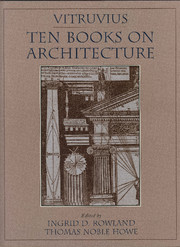Book contents
- Frontmatter
- Dedication
- Contents
- Acknowledgments
- List of Illustrations
- Translator's Preface
- Illustrator's Preface
- VITRUVIUS
- INTRODUCTION
- LIST OF MANUSCRIPTS SEEN
- THE TRANSLATION
- Book 1 First Principles and the Layout of Cities
- Book 2 Building Materials
- Book 3 Temples
- Book 4 Corinthian, Doric, and Tuscan Temples
- Book 5 Public Buildings
- Book 6 Private Buildings
- Book 7 Finishing
- Book 8 Water
- Book 9 Sundials and Clocks
- Book 10 Machines
- COMMENTARY
- Index
Book 7 - Finishing
Published online by Cambridge University Press: 18 December 2014
- Frontmatter
- Dedication
- Contents
- Acknowledgments
- List of Illustrations
- Translator's Preface
- Illustrator's Preface
- VITRUVIUS
- INTRODUCTION
- LIST OF MANUSCRIPTS SEEN
- THE TRANSLATION
- Book 1 First Principles and the Layout of Cities
- Book 2 Building Materials
- Book 3 Temples
- Book 4 Corinthian, Doric, and Tuscan Temples
- Book 5 Public Buildings
- Book 6 Private Buildings
- Book 7 Finishing
- Book 8 Water
- Book 9 Sundials and Clocks
- Book 10 Machines
- COMMENTARY
- Index
Summary
PREFACE
1. Our ancestors, not only wisely but also usefully, established the practice of transmitting their ideas to posterity through the reports of treatises, so that these ideas would not perish, but instead, as they grew with each passing age and were published in books, they would arrive, step by step, at the utmost refinement of learning. Thus it is not moderate, but infinite thanks that should be given those who did not jealously let their ideas pass in silence, but rather took care to hand on to memory their thoughts of every kind, preserved in their writings. 2. Indeed, had they not done so, we could not have known what deeds were done in Troy, nor what Thales, Democritus, Anaxagoras, Xenophanes, and the other physicists had thought about Nature,* nor what rules for living had been set down for humanity by Socrates, Plato, Aristotle, Zeno, Epicurus and the other philosophers,* nor what deeds Croesus, Alexander, and the other kings had done,* and for what reasons – not unless our ancestors, in compiling their precepts, had published them in treatises, commending them to the memory of all for posterity.
3. And just as thanks are due to these authors, those who, by contrast, steal the writings of these others and pass them off as their own should be censured, and those who do not rely on their own ideas in their writings, but rather, with envious character, do violence to other men's work and glory in it, these people are not only to be criticized, but, because they have lived impiously, should even be prosecuted as criminals. Nor indeed are these matters said to have been lightly punished by the ancients. It is not out of place to explain what outcomes such cases had before a court of law, when they have been handed down to us. 4. The Attalid kings, introduced to the manifold charms of literature, had established the great library of Pergamum* for the delight of all; then, likewise, Ptolemy, with boundless zeal and spurred by ambitious desire, had striven with no less passion to compete by establishing the library at Alexandria.
- Type
- Chapter
- Information
- Vitruvius: 'Ten Books on Architecture' , pp. 85 - 95Publisher: Cambridge University PressPrint publication year: 1999

